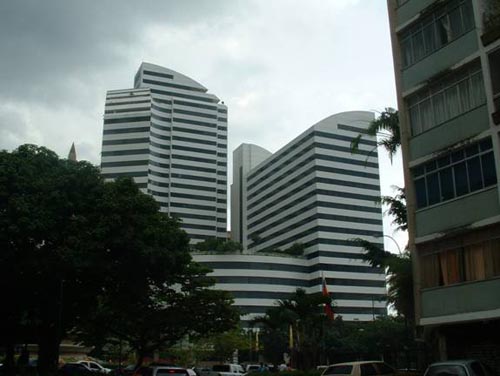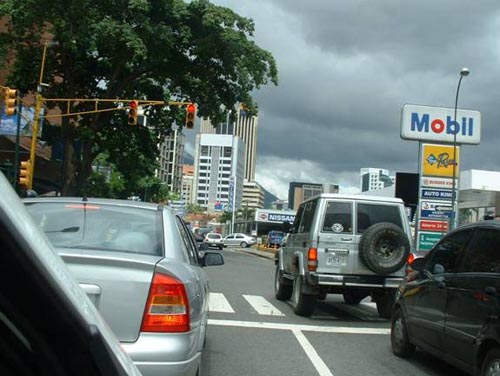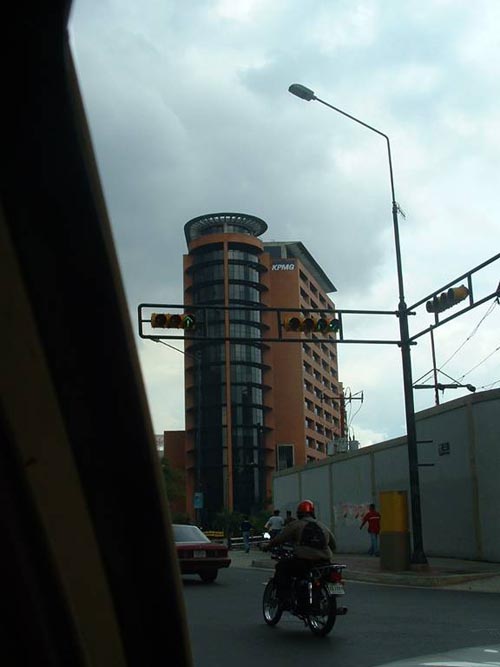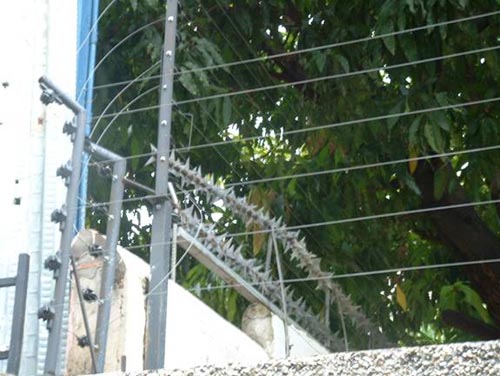|

[In the second of his two-part story on Venezuela’s metamorphosis, Mike shows some of the modern wealth that remains as it increasingly faces opposition from the poor and middle class who have struggled and continue to struggle heroically to prove that “a better world is possible.”—CB]
VENEZUELA
Caracas, Part II
By Michael C. Ruppert
© Copyright 2006, From The Wilderness Publications, www.fromthewilderness.com. All Rights Reserved. This story may NOT be posted on any Internet web site without express written permission. Contact admin@copvcia.com. May be circulated, distributed or transmitted for non-profit purposes only.
THE CITY

High Rises
September 13th 2006, 1:41PM [PST] - Caracas is an ultra-condensed cacophonous kaleidoscope of colorful contrast that can overwhelm gringo* senses with the data from just a brief glance. As with exposure to very bright sunshine, one’s first inclination is to either put on mental sunglasses or squint until the overload can be absorbed. Traffic, especially during rush hour can make Midtown Manhattan seem like a picnic. Beat-up jalopies, Chevys, Fords and Toyotas, scores of variously painted (or unpainted) buses reminiscent of Mexico, and motorbikes with riders wearing US military helmet liners integrate with BMW M3s, new SUVs and Mercedes Benzes in – especially at uncontrolled intersections – what looks like a rule-less contest. Right of way in cross traffic is determined only by whose fender gets in front of someone else’s bumper, the distance between, before yielding often determined by inches, sometimes less.

Modern Wealth
In between all this, pedestrians ooze like squished liquid. Ambulances and police vehicles sit helplessly stranded in traffic, their sirens wailing more like helpless pleas of animal frustration than commands. They are often submerged in a chaotic symphony of car horns and alarms. The car horns and alarms, if they had rhythm, are as overlapping and frequent as the percussive beats in a Tito Fuentes album. The car alarms play all night.
Yet after a month-and-a-half here I have not seen a single traffic accident and not once have I seen an instance of the road rage so common in the US. There just isn’t that kind of desperation here, and the smiles on the faces of people on the street are more common and certainly more authentic, even in traffic.
Caracas is hard to categorize. Juxtaposed to the poverty of the barrios are a multitude of modern, high-rise commercial towers bearing the logos of major western companies, from Hewlett Packard, to Nescafe, to Citigroup, to ING. There are also high-rise towers with Venezuelan and Latin American company logos like Movilnet owned by CanTV, both fully Venezuelan enterprises, enough to convince anyone that Caracas is also a financial and economic powerhouse.

KPMG Tower
Hugo Chavez is smart. Though his government is socialist, the right of private property ownership is enshrined in the new Venezuelan constitution. Chavez has never threatened the income of the multi-nationals to the point where their accountants would see a greater return in the destruction of the country’s economy in order to start a “war-to-the-death” coup. Although murderous and backed by the CIA and U.S., the 2002 anti-Chavez coup never reached a point where there was no turning back for the Norte Americanos. The corporations only lost a few days of business.
SOCIALISM
All socialism means is that important common resources and infrastructure should be owned by the state for the benefit of the people (rather than shareholders who often have no connection with or concern for the people). In Venezuela, socialism also means worker ownership and self-management. Curiously, Norway is a socialist country, so ideology is not the issue there, and the US is not trying to destabilize Norway. But then Norwegians are not a people of color either.
Although economic damage was again tried through the deliberate sabotage of the Venezuelan state-owned oil company, PDVSA, in 2002 and 2003, it failed when the people rose up and a few stalwart hands remained at otherwise abandoned posts to face sabotaged computers, corrupted data bases, missing files and stolen passwords. (Been there, done that, got the T-shirt.) Venezuela’s poor understood that the attempt to break PDVSA’s back was not the result of Chavista incompetence but the work of managers and an upper class that owed more allegiance to major oil companies and Wall Street than to the nation itself.
PDVSA’s production was almost completely shut down for months, and the nation’s economy, the poor especially, suffered without gasoline for weeks, but there were no electricity blackouts. A new economy had to be born as a necessity of survival.
Food distribution threatened to break down because big food distributors joined in the strike. As a result, the government ended up taking over food distribution. The oil coup and sabotage was so effective that PDVSA production was slashed from an estimated 3 Mbpd to around 200,000 bpd for two months. However, the coup that had again been hoped for did not materialize, and Chavistas only emerged stronger. Records acquired after that sabotage show that it was also backed by the US government.
Chavez and I both know something about sabotage.
AFFLUENCE
There are four and five-star hotels scattered along the main east-west corridor, close to important business and financial districts where skyscrapers rise forty and fifty stories into humid, tropical skies. There is a freeway system and, underneath it all, a very modern, clean subway system that is almost a carbon copy of Washington D.C.’s Metro. It should be. As Venezuelan-American author and attorney Eva Golinger told me, it was designed by the same person. The Chavez government has nearly completed two north-south spurs financed with oil profits from PDVSA since 2000.
Subway
There are many huge malls, some hidden within large office towers, where the cultural contrasts are most obvious. In one large mall, El Recreo, it is not uncommon to see a Venezuelan paratrooper, ready to defend against a US invasion, walking right underneath a replica of the Statue of Liberty on his way to get a slice of “New York” pizza. (It’s pretty good.)
Statue Of Liberty
When I went to Moscow in 2001 – my first real foreign adventure aside from Canadian and Mexican border towns – I was dismayed to see a McDonald’s on Tverskaya, Moscow’s main boulevard, just three blocks outside of Red Square.
In Caracas there is a McDonald’s on the average of about every three blocks in almost every part of the city. They are always full. But even more plentiful are Caracas’ equivalent of Manhattan’s sidewalk hot dog stands. In Caracas these stands offer hot dogs, hamburgers and pepinos--giant sandwiches with almost every food substance known to man and every accessory from ketchup, mustard and mayonnaise to barbeque and raw garlic sauce dripping from them. The burgers are better than McDonald’s, and you can get one with chicken if you want. Chicken is more expensive. These stands vibrate with customers 18 hours a day.
The naïve here argue that the McDonald’s are all franchise operations and therefore locally owned. They seem not to recognize the hundreds of millions of dollars that flow back to McDonald’s headquarters in franchise fees and licensing agreements. (Mc Donald’s and other fast food franchises were the only transnational corporations to support the oil industry shut-down for the entire two months.) They also seem not to understand the insidious cultural influence they bring. I am reminded of a statement I heard made during a speech by Russian nationalist Vladimir Zhirinovsky in Moscow who quipped, “The Americans have one philosophy for everything, ‘Let them eat Big Macs’”.
Incidentally, the strike gave birth to the Mercal stores where the government sells basic food supplies at an average 40% discount. Mercal stores are found nationwide, mostly in the barrios.
It is the street or “informal” economy has been around for a very long time and is another of Venezuela’s secret weapons. From the teeming and dangerous Sabana Grande – an almost mile-long stretch of crowded booths selling everything from CDs and DVDs to (probably) LSD; from clothing to cutlery; from dry goods to diapers – Caracas’ physiology is one which incorporates two parallel economies. With economic collapses in 1998, and especially during the PDVSA sabotage, the people started a whole new economy, outside of major banks (many linked to the US or US-owned), computer systems, and outside of the control of almost everything, including the government. Venezuelans know how to survive, and this parallel economy is immune from US economic or corporate interference. It may prove to be a safety net in the upcoming elections.
Sabana Grande
Aside from Sabana Grande, perhaps nowhere else is the street economy more visible than in the Capitolo district where one finds the National Assembly, the Foreign Ministry and all the major offices of government. Venezuela is a gold-producing nation, so quoted market prices mean little. (I found out the hard way.)
Assemblia Nacional
Even within upscale communities like Altamira (a seat of opposition power) and La Florida there can be stark contrasts between rich and poor. Luxury high-rise apartment towers have external security that is more reminiscent of a supermax prison than anything else. Most of these towers are surrounded by high cement walls, guard stations and electrified wire. Electrified fences also protect some restaurants. These are the marks of cultures that have become accustomed to civil unrest in areas of the world where the imperial powers have used it as a tool of control and intimidation.

Electrified Fence
Banco Del Caribe
Though I have seen very little of it, the nightlife in Caracas is energized and very much for the young. The tropical nights are some of the most embracing I have ever felt, and it is for that reason that parks and public places are often filled until the wee small hours with people, sometimes entire families, just sitting and talking. Venezuelans are justifiably proud when they remark that Venezuela has produced more Miss Universes than any country in the world. It is not hard to see why.
This city is alive.
There is still long-lingering corruption, a confusing patchwork of municipal and regional police agencies, and Venezuelans can be quickly suspicious of a gringo rubio, like me, walking around taking pictures in certain areas. Yet there is always a distinct friendliness and openness as I blusteringly try to use my rapidly-improving Spanish and explain that I left Los Estados Unidos to live here by choice. Practico mi Espaňol cada dia!
As so eloquently and precisely documented by Venezuelan-American attorney and author Eva Golinger in The Chavez Code, it was in this city in April, 2002 that opposition leaders backed and funded by the CIA, the State Department, and the National Endowment for Democracy (NED) planned and executed a plot to shoot some of their own supporters in the back and blame this on Chavez. It was in this city that a CNN crew, headed by Otto Neustald fraudulently taped an emergency message describing the violence the night before it happened, only to air it the next day as breaking news.
Some in Caracas defend CNN for being the first to break the cartel-controlled myth that Chavez has resigned the presidency and disclose that the coup had failed. But then they acknowledged that the reporter who did it is gone while the network remains; shares of Time Warner still riding high on Wall Street.
It was and is in this city where NED, the US Agency for International Development (USAID) and the US government backed the NGO Súmate, indicted for violating election laws in a 2004 recall referendum (which Chavez won). Súmate is still ruthlessly active, dispensing cash, equipment and organizational expertise and influence among the opposition in preparation for the coming election. It is a crime in any country for an outside government to finance election campaigns. Golinger’s superb use of (what remains post-9/11) the Freedom of Information Act (FOIA) showed that the US was directly funding Chavez opposition in violation of both US and Venezuelan law.
On November 14, 2004, as reported by Golinger, National Prosecutor Danilo Anderson was assassinated by a car bomb in Caracas as he moved ahead with investigations and prosecutions of those who had violated Venezuela’s constitution in the coup and during the recall. “Though none had yet been indicted on criminal charges, several of those implicated fled to Miami.”2
There is going to be a presidential election here on December 3rd. And although most believe that Hugo Chavez will win a second six-year term, everyone is on edge about what tricks will be played, where and when the guns and bombs will come out, how the infrastructure might be sabotaged or how the opposition will try to provoke Chavez into bloody repression which will then be spun by a voracious global corporate media. Chavez has always refused to take that bait.
I’m betting on Chavez. But I am placing no bets that it will be an easy, straightforward, or honorable contest, or that it will be resolved with just this election. The CIA has just appointed a new regional operations chief within its Latin American Division specifically focused on Cuba and Venezuela. The US Ambassador, William Brownfield, has a résumé that reads like a CIA Directorate of Operations and going back to the days of Chile, Salvador Allende, Latin America’s best-known terrorist, Luis Posada Carriles (who blew up a Venezuelan airliner headed for Cuba in 1976), Iran-Contra, and Colombia. Right-wing Colombian paramilitaries are reportedly infiltrating Venezuela’s western border, and some have reportedly been housed on estates close to Caracas owned by wealthy pro-US backers.
There is no shortage of stimuli in Caracas.
A Special Thank You -- My first days in Caracas were filled with many hard challenges. After a telephonic introduction by my friend Al Giordano of Narconews, the Editor of Venezuela Analysis, Greg Wilpert stepped up and provided crucial assistance in the early days. An expatriate US citizen Greg, who has a Ph.D., provides cogent and detailed political, economic and social information on Venezuela. He has been a true friend and I cannot sufficiently express my gratitude.
Greg Wilpert of Venezuela Analysis.com has been a great friend. An expatriate American married to a Venezuelan wife he is bilingual and does solid analysis of events here.
Special thanks are also due to the heroes at Vheadlines.com: Professor Franz J.T. Lee, Roy Carson, Magda and Vanessa, who from a distance extended themselves to assist me when I most needed it.
__________
* -- In this story I use the term gringo to represent a citizen of the United States. The term “American” as US citizens use it, is actually technically incorrect and slightly offensive. All native-born persons in the western hemisphere are Americans. The proper term for a U.S. citizen is Estadounidense (U- knee – dense – ay) and my Far Side sense of humor finds the use of dense particularly poetic. For brevity and clarity in this article I use the term gringo, because, given its common understanding and use in Latin America, with a pejorative connotation, it best describes what North Americans have been in Latin America.
1 Colby, Gerard, with Charlotte Dennet, THY WILL BE DONE – THE CONQUEST OF THE AMAZON: Nelson Rockefeller and Evangelism in the Age of Oil, Harper Collins, 1976, pp 90-91
2 Golinger, Eva, The Chavez Code, INSTITUTO CUBANO DEL LIBRO, 2005, P166.
|



